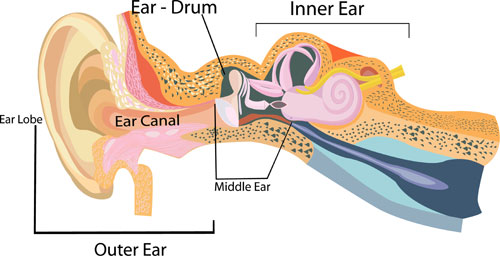Hearing is one of our most important senses, allowing us to communicate and interpret sounds in the world around us.
Experiencing any amount of hearing loss or a change in hearing can be worrisome — and once you’ve lost it, you can’t get it back.
Hearing loss can occur for many reasons. It often happens gradually as you grow older, but it can also happen from an injury, inherited genetics and even prolonged exposure to loud noises over time — such as working in noisy environments like construction zones or concert venues.
Let’s cover some of the basics of how our hearing works, common types of hearing loss and what to do if you experience problems with your hearing.
How Does Hearing Work?
Inside our ears is a tiny, complex system of bones, ligaments, fluids and membranes — and if any part of the ear doesn’t work as it should, hearing can be impacted.
When something makes a sound or when someone speaks, sound waves are emitted through the air. Our ears turn those waves into electrical signals, which are then carried to the brain, where they are translated into what we hear.
Parts of the Ear
This chart from the Centers for Disease Control and Prevention (CDC) shows a breakdown of the different parts of the inner, middle and outer ear:
Inner Ear
The inner ear is made up of the snail-shaped organ for hearing, known as the cochlea, which helps us balance.
Middle Ear
The middle ear is made up of the eardrum and three small bones — called ossicles — that send the eardrum’s movement to the inner ear through small vibrations.
Outer Ear
The outer ear — the part we see on the side of our head — is made up of the pinna and canal.
Types of Hearing Loss
There are three common types of hearing loss.
Conductive Hearing Loss
Conductive hearing loss is caused by something that stops sounds from getting through the outer or middle ear. This type of hearing loss can often be treated with medicine or surgery.
Sensorineural Hearing Loss
Sensorineural hearing loss occurs when there is a problem with how the inner ear or hearing nerve works. This type of hearing loss can be treated with a cochlear implant.
Mixed Hearing Loss
Mixed hearing loss includes both conductive and sensorineural hearing loss.
Hearing Loss and Depression
Studies have shown that hearing loss can increase a person’s risk of developing mental health issues. Living with hearing impairment can present challenges with a person feeling socially inept when they cannot properly hear or understand conversations they’re engaged in. For example, a person with a hearing impairment who is attending a party may struggle to hear conversations happening around them and may feel socially isolated.
Listen to the Facts
Hearing loss affects millions of people in the United States, and it can happen to anyone at any stage in life. Some people are born experiencing hearing loss, and some people develop issues later in life.
?? According to the Centers for Disease Control and Prevention (CDC), hearing loss is the third-most common chronic health condition in the U.S.
?? About 40 million adults aged 20-49 have reported experiencing noise-induced hearing loss.
?? About 1 in 4 U.S. adults who report excellent to good hearing already have hearing damage.
?? Hearing gets worse over time the more often people are exposed to loud sounds.
Protecting Your Hearing — How Loud is Too Loud?
In this infographic from the CDC, you can find out how certain noises — such as lawnmowers, sporting events and fireworks — register on a decibel level and how these levels that are too loud can cause damage to your hearing. Click here to check out the CDC’s interactive website.

What should you do if you experience problems with your hearing?
Early treatment for hearing loss is important. If you’re experiencing hearing loss, don’t ignore it. Talk with your doctor — who, depending on the problem, may refer you to an ear, nose and throat specialist, audiologist, or otologist to determine the cause of your hearing loss and find the best treatment.
Find a hearing specialist
Click here to find a doctor on tanner.org.